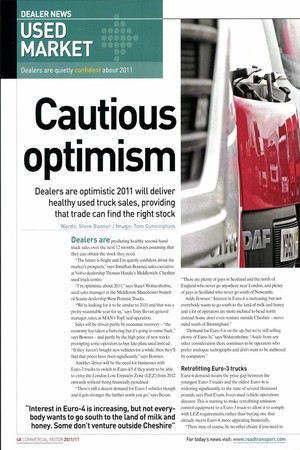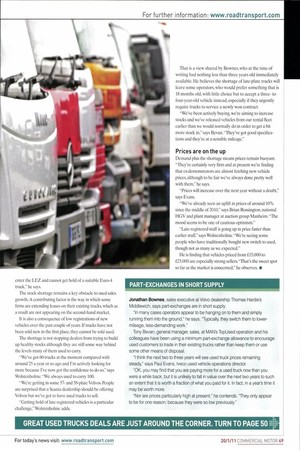Cautious optimism
Page 48

Page 49

If you've noticed an error in this article please click here to report it so we can fix it.
Dealers are optimistic 2011 will deliver healthy used truck sales, providing that trade can find the right stock
Words: Steve Banner / Image: Tom Cunningham Dealers are predicting healthy second-hand truck sales over the next 12 months, always assuming that they can obtain the stock they need.
"The future is bright and I'm quietly confident about the market's prospects," says Jonathan Bownes, sales executive at Volvo dealership Thomas Hardie's Middlewich, Cheshire used truck centre.
"I'm optimistic about 2011," says Stuart Wolstenhohne, used sales manager at the Middleton, Manchester branch of Scania dealership West Pennine Trucks "We're looking for it to be similar to 2010 and that was a pretty reasonable year for us," says Tony Bevan, general manager, sales, at MAN's TopUsed operation.
Sales will be driven partly by economic recovery —"the economy has taken a battering but it's going to come back," says Bownes — and partly by the high price of new trucks prompting some operators to buy late-plate used instead. "If they haven't bought new vehicles for a while, then they'll find that prices have risen significantly," says Bownes.
Another driver will be the need for businesses with Euro-3 trucks to switch to Euro-4/5 if they want to be able to enter the London Low Emission Zone (LEZ) from 2012 onwards without being financially penalised.
"There's still a decent demand for Euro-3 vehicles though and it gets stronger the further north you go," says Bevan. "There are plenty of guys in Scotland and the north of England who never go anywhere near London, and plenty of guys in Scotland who never go south of Newcastle.
Adds Bownes: "Interest in Euro-4 is increasing, but not everybody wants to go south to the land of milk and honey and a lot of operators are more inclined to head north instead. Some don't even venture outside Cheshire — never mind south of Birmingham."
"Demand for Euro-4 is on the up, but we're still selling plenty of Euro-3s," says Wolstenholme. "Aside from any other consideration there continues to be operators who prefer analogue tachographs and don't want to be mithered by computers"
Retrofitting Euro-3 trucks
Euro-4 demand means the price gap between the youngest Euro-3 trucks and the oldest Euro-4s is widening significantly, to the tune of several thousand pounds, says Paul Evans, Iveco used vehicle operations director. This is starting to make retrofitting emission control equipment to a Euro-3 truck to allow it to comply with LEZ requirements, rather than buying one that already meets Euro-4, more appealing financially.
"There may, of course, be no other choice if you need to enter the LEZ and cannot get hold of a suitable Euro-4 truck," he says.
The stock shortage remains a key obstacle to used sales growth. A contributing factor is the way in which some firms are extending leases on their existing trucks, which as a result are not appearing on the second-hand market.
It is also a consequence of low registrations of new vehicles over the past couple of years. If trucks have not been sold new in the first place, they cannot be sold used.
The shortage is not stopping dealers from trying to build up healthy stocks although they are still some way behind the levels many of them used to carry.
"We've got 60 trucks at the moment compared with around 25 a year or so ago and I'm actively looking for more because I've now got the confidence to do so," says Wolstenholme. "We always used to carry 100.
"We're getting in some 57and 58-plate Volvos. People are surprised that a Scania dealership should be offering Volvos but we've got to have used trucks to sell.
"Getting hold of late-registered vehicles is a particular challenge," Wolstenholme adds That is a view shared by Bownes, who at the time of writing had nothing less than three years old immediately available. He believes the shortage of late-plate trucks will leave some operators, who would prefer something that is 18 months old, with little choice but to accept a threeto four-year-old vehicle instead, especially if they urgently require trucks to service a newly won contract.
"We've been actively buying, we're aiming to increase stocks and we've released vehicles from our rental fleet earlier than we would normally do in order to get a bit more stock in," says Bevan. "They've got good specifications and they're at a sensible mileage."
Prices are on the up
Demand plus the shortage means prices remain buoyant. "They're certainly very firm and at present we're finding that ex-demonstrators are almost fetching new vehicle prices, although to be fair we've always done pretty well with them," he says.
"Prices will increase over the next year without a doubt," says Evans.
"We've already seen an uplift in prices of around 10% since the middle of 2010," says Brian Rossington, national HGV and plant manager at auction group Manheim. "The mood seems to be one of cautious optimism" "Late-registered stuff is going up in price faster than earlier stuff," says Wolstenholme. "We're seeing some people who have traditionally bought new switch to used, though not as many as we expected."
He is finding that vehicles priced from £15,000 to £25,000 are especially strong sellers. "That's the sweet spot so far as the market is concerned," he observes •
PART-EXCHANGES IN SHORT SUPPLY
Jonathan Bownes, sales executive at Volvo dealership Thomas Hardie's Middlewich, says part-exchanges are in short supply.
"In many cases operators appear to be hanging on to them and simply running them into the ground," he says. "Typically, they switch them to lowermileage, less-demanding work."
Tony Bevan, general manager, sales, at MAN's TopUsed operation and his colleagues have been using a minimum part-exchange allowance to encourage used customers to trade in their existing trucks rather than keep them or use some other means of disposal.
"I think the next two to three years will see used truck prices remaining steady," says Paul Evans, lveco used vehicle operations director.
"OK, you may find that you are paying more for a used truck now than you were a while back, but it is unlikely to fall in value over the next two years to such an extent that it is worth a fraction of what you paid for it. In fact, in a year's time it may be worth more.
"Nor are prices particularly high at present," he contends. "They only appear to be for one reason; because they were so low previously."
































































































































